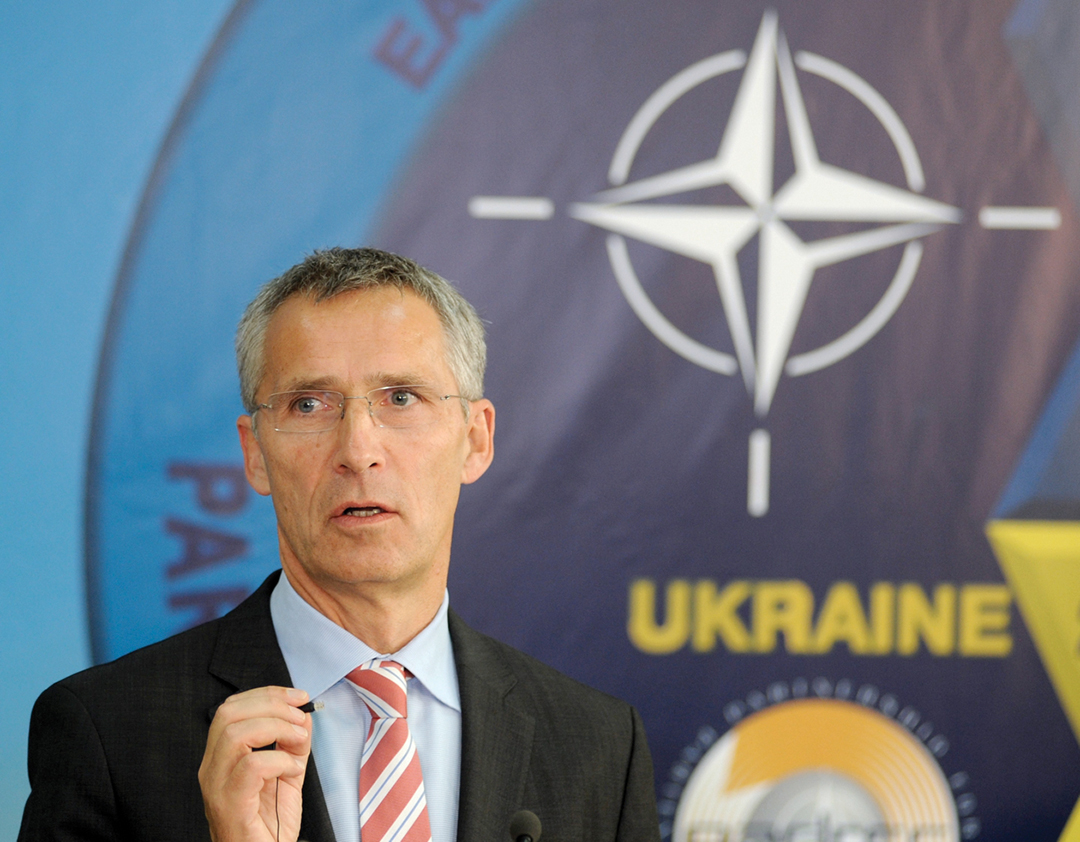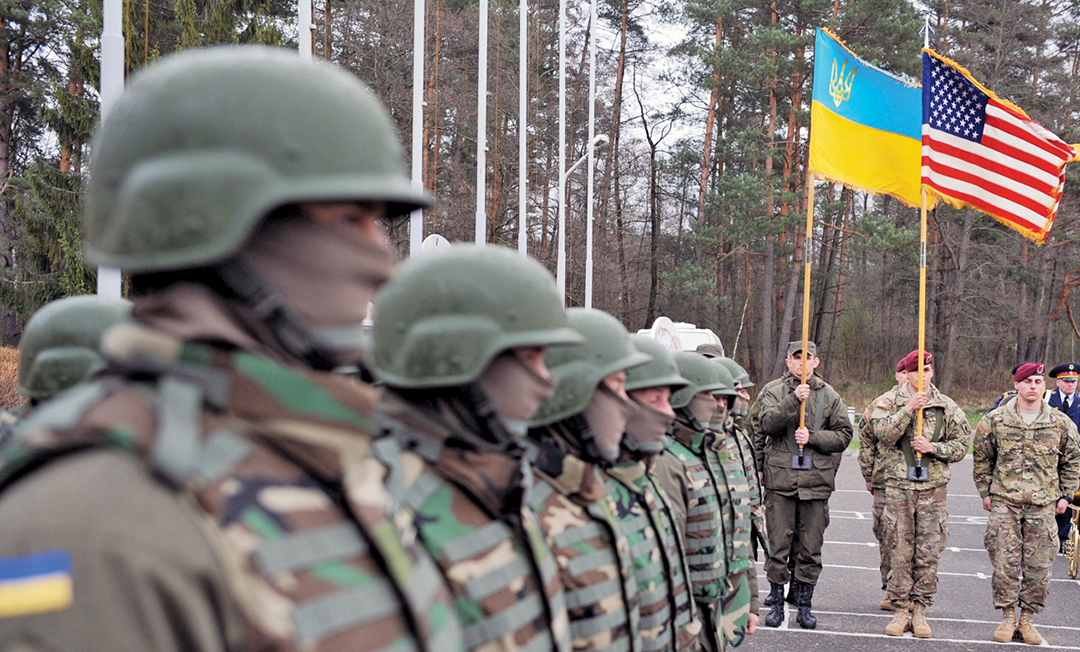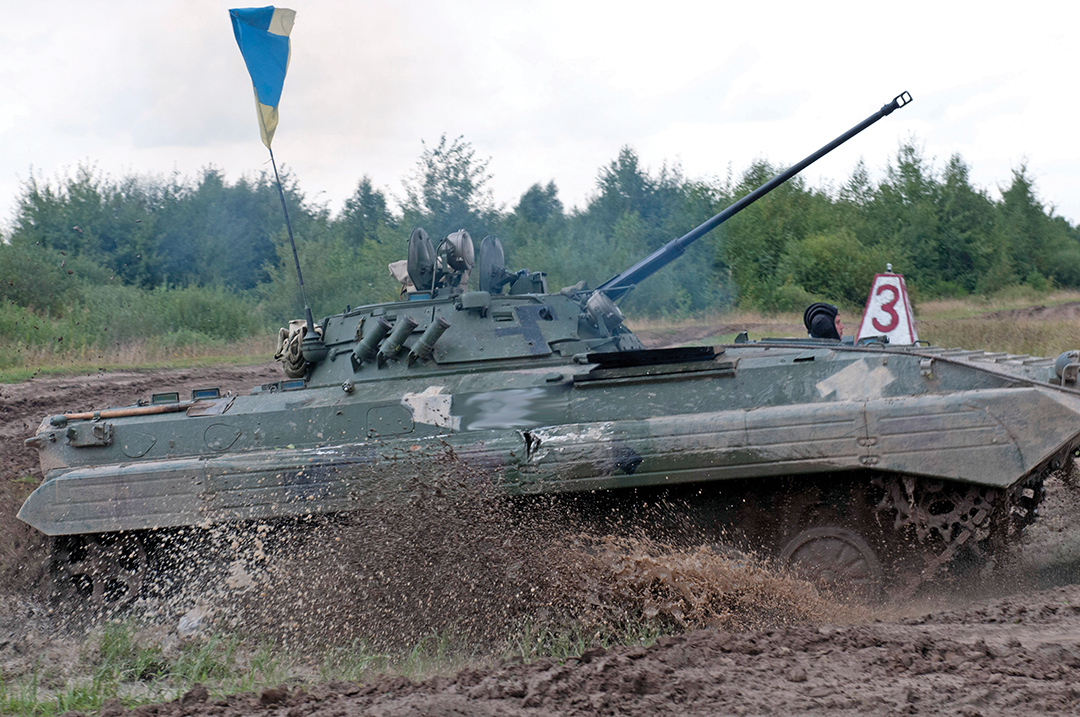Developing and Improving Ukraine’s Military Education Process
By Maj. Gen. Igor Tolok, Ukrainian Ministry of Defense
The Revolution of Dignity opened a new chapter in the history of Ukraine, paving the way for a new open society, free of corruption and the vestiges of the past and encouraging a new level of national patriotism. The Ukrainian people opted for European development, reform and peaceful coexistence. But Russia’s aggressive geopolitical position, its struggle to dominate the region and even the world, and its disregard of international law and the laws of war led to the annexation of Crimea and armed conflict in the eastern part of Ukraine.
Using new hybrid war methods and means, Russia has been able to deceive the population, build up separatist sentiment and create illegal separatist groups that are armed, trained and financially motivated.
In addition, neglect of potential threats and modern challenges by the nation’s previous leadership, together with the “residual principle” of funding the Armed Forces, meant that national security forces were not prepared to repulse Russian aggression — not only in terms of arms and military equipment, but also in terms of professional and psychological readiness to use them in hybrid war scenarios, especially in urban areas and when the enemy uses civilians as cover for armed operations.

In these conditions, one priority in building Ukraine’s defense potential was to implement a series of measures to improve the content and quality of training for military specialists, enhance their psychological and moral preparedness for the new kind of warfare, and facilitate the acquisition of practical professional military skills. This was done under the supervision of the Department of Military Education and Science of the Ukrainian Ministry of Defence in coordination with the General Staff of the Ukrainian Armed Forces and Armed Forces commands.
The new training program (conferences, seminars, roundtables, instructional and methodological classes, demonstrations and participation of teaching staff in anti-terrorist operations) has resulted in the higher military education system moving gradually from a traditional, classical and static educational process to a dynamic system of rapid changes to training standards, programs, and forms and methods based on ongoing analysis of how forces have been used in anti-terrorist operations and lessons from local wars and modern-day conflicts.
The qualifications required of specialists have been amended. Priority is given to the practical component of training, while the approaches to general military, psychological and physical training, tactical medicine, and the acquisition of practical command skills and leadership qualities have undergone drastic changes. The comprehensive nature of the types and methods of training, in cooperation with experts in various specializations, forms the basis of professional troop training, along with the broad involvement of students and teaching staff.
Higher military training institutions have begun to introduce up-to-date approaches to the training of specialists, ensuring that the graduate’s skill level is as close as possible to force requirements. For example, a three-phase flight training system has been developed and implemented for the first time at Kharkiv Air Force University, providing training on combat planes and helicopters prior to graduation, and graduates are awarded a master’s degree upon completion. Flight practice on combat planes and helicopters is given directly in the combat units in which they will subsequently serve. The pilot-instructors are officers who have experienced combat in the anti-terrorist operations area and have received state awards. The first class of master pilots graduated in June 2016.
Russia’s unconcealed aggression in eastern Ukraine and lessons from other local conflicts have clearly shown that, in an environment of modern hybrid war, Ukraine’s security is based on involvement in collective security organizations. Although Russia’s main reason for instigating conflict in eastern Ukraine was to obstruct our country’s aspiration to associate with the European Union, Ukraine has unambiguously chosen the path of further integration with the EU and membership in NATO.
Accordingly, one of the priorities in developing the military education system is to improve European and Euro-Atlantic integration and to enhance and expand relations with the higher military training institutions of EU and NATO countries.

AFP/GETTY IMAGES
Ukrainian higher military training institutions play an active part in NATO’s Defence Education Enhancement Programme (DEEP), which is intended to help NATO partner nations develop and reform their national military education systems.
The Department of Military Education and Science, in cooperation with NATO, organized a set of events to involve higher military training institution staff — first and foremost teaching staff — in exchanges with similar foreign institutions about the military education process, and in discussions with foreign specialists about developing training plans and programs.
DEEP has a great deal to offer in improving the national military education system.
For teachers: Understanding the methods used to train military specialists abroad; studying modern, active education technology and introducing it to the training process; learning NATO’s English terminology to work with primary sources of NATO documents and standards; and creating the conditions for implementing NATO standards in the training process.
For students: Helping them cultivate European values and acquire leadership and professional qualities in accordance with NATO standards; and preparing them to perform tasks in international military units.
For higher military training institutions: Making the national military specialist training system compatible with European training standards; and establishing cooperation regarding the rapid exchange of experience with the military training institutions of NATO nations.
DEEP not only offers a unique opportunity to learn about worldwide experiences in military specialist training, but also provides a catalyst for the teachers’ self-improvement and the implementation of new approaches to training under specific conditions.
Thanks to the results-oriented work of the Department of Military Education and Science, the general staff of the Ukrainian Armed Forces and Armed Forces commands, higher military training institutions successfully implemented a network of skills enhancement courses providing short-term programs for reserve officers called up during the mobilization of 2014-2015. With the modular principle of program building, the strong general military section and intensive specialized practical training, it has been possible, in just a short time, to recover lost professional and tactical medical skills, ensure psychological readiness for action in modern conditions and meet the requirements of troop mobilization.
As a result of studying foreign experiences and military specialist training programs, especially in the field of leadership building, it has been possible to develop a legal mechanism, introduce a new training system and give noncommissioned officers a unique higher education opportunity: If they have displayed leadership qualities and shown courage and heroism in combat conditions, they may gain the rank of lieutenant after three months of specialized training and also gain career development opportunities.
A series of DEEP seminars on the organization of training activities, active teaching methods, and development of educational plans and programs — given by leading lecturers from higher military training institutions in NATO nations — provided the impetus for a review of traditional approaches to organizing training and educational activities and an exploration of ways to intensify cooperation among those involved in the education process. Based on the results of these seminars, preparatory work was carried out in all faculties of Kharkiv Air Force University. During training and methodical sessions before the beginning of the 2015-2016 academic year, a pedagogical technology fair with a competition was held. Each faculty presented its implementation of an active teaching method (such as case studies and role playing) to enhance cognitive activity during study. The value of each innovation, and ultimately the winners of the competition, were determined on the basis of lecturers’ votes. The competitive nature of the event significantly increased the lecturers’ motivation to improve.
Systemic improvements have been made to language training. Despite the resources required by the Ukrainian Armed Forces (UAF) to conduct the anti-terrorist operation in eastern Ukraine, the Department of Military Education and Science was able to resume language training courses in September 2015 at specific higher military training institutions. Under DEEP, enhanced foreign language training for UAF officers was organized at higher military training institutions in NATO nations. Students attained a foreign language competence at the level of NATO Standardization Agreement 6001.
The fact that teaching staff and students have greater foreign language proficiency means that some courses can be taught in a foreign language, and new approaches to teaching are possible. It is good to see that students understand the importance of language training and wish to develop their language skills for use during peacekeeping activities and official cooperation with foreign partners.
For several years, Kharkiv Air Force University has offered the option of preparing and defending work submitted for bachelor’s and master’s degrees in a foreign language. In 2016, 12 students successfully defended their work in English and, in accordance with state certification, received a diploma with distinction.

An important achievement is the introduction of aviation English for university students in accordance with International Civil Aviation Organization (ICAO) standards. Student pilots and air traffic control experts can improve their practical language skills both in the university and in Ukraerorukh, a public enterprise working closely with the university to improve the training system for flight experts in accordance with ICAO and Eurocontrol standards.
In just a short time, DEEP has proven effective in improving the higher military education system in Ukraine and ensuring that approaches to education and the content of training are compatible.
Another indisputable achievement is overcoming the psychological barrier between teachers from higher military training institutions in NATO nations and those from countries of the former Soviet Union, and also establishing friendly relations between higher military training institutions of the Ukrainian Armed Forces and partners abroad.
Conclusion
The Ukrainian military education system is undergoing systematic improvements, taking account of the best traditions of international experience, and is focused on providing the Armed Forces with officers with high-level combat capacities who are able to work together with NATO Armed Forces.
The implementation of the conceptual principles to further develop military education must guarantee the transition to a new type of humanistic and innovative military education, one that will increase the professional, intellectual, scientific, cultural, spiritual and moral potential of military specialists. This will lead to positive changes in the military education system, military schools, and departments and units of the Ukrainian Armed Forces in terms of the quality of military specialist training, strengthening defense capabilities and developing the theory and practice of military art and modern force principles.
The independence, self-sufficiency and creative activities of military specialists will be increased, and this will help them perform their tasks, regardless of the complexity or conditions. This will boost the national self-identity processes of military specialists, their authority in society and the status of Ukrainian officers at the international level.


Comments are closed.